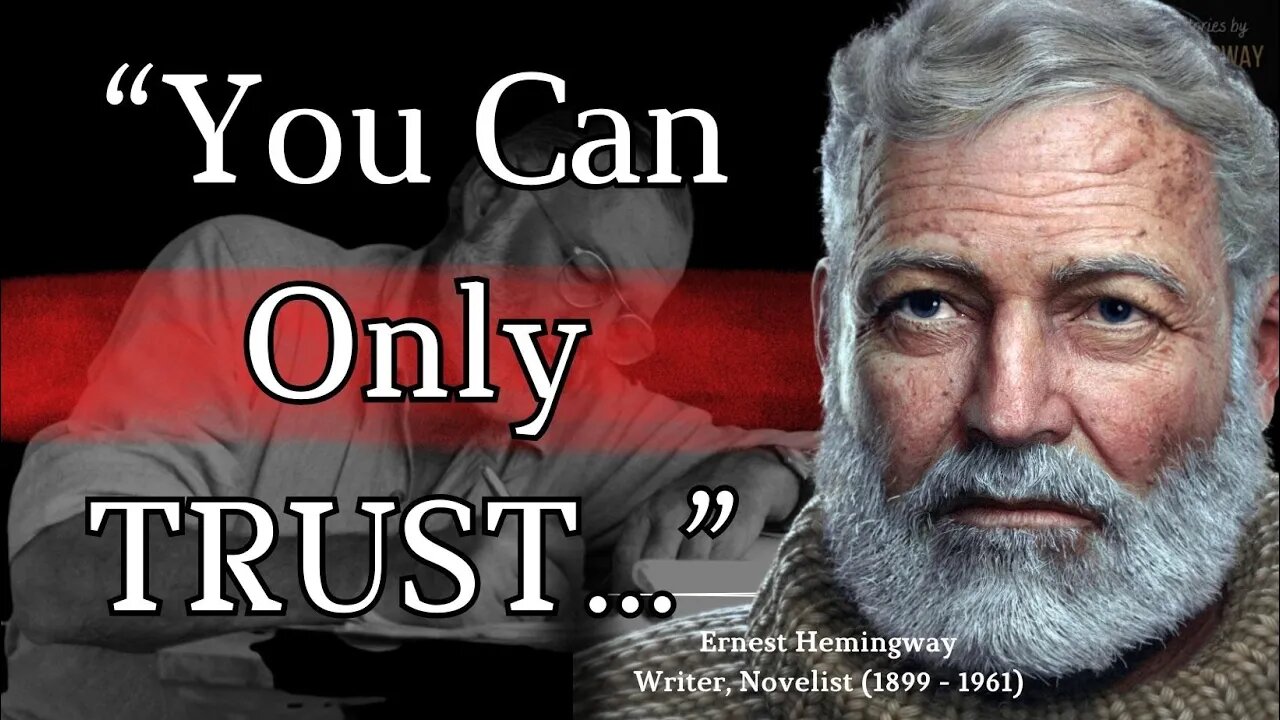Premium Only Content

You Want to Know WHO You Can TRUST?! Ernest Hemingway Quotes.
Ernest Hemingway, whose full name is Ernest Miller Hemingway, was an American novelist and short-story writer who was awarded the Nobel Prize for Literature in 1954. He was born on July 21, 1899, in Cicero, Illinois, now known as Oak Park, and passed away on July 2, 1961, in Ketchum, Idaho.
He was renowned for his writing's fierce masculinity as well as for his an exciting and well-documented life. His concise and clear prose had a significant impact on 20th-century American and British fiction.
The unique writing style of Ernest Hemingway broke the mold. His style differed from every other novelist before him in that it used short, declarative sentences, repeated phrases on purpose, and lacked adjectives in most places.
He spent the majority of his time in the military, liked to drink, and imbued these traits into his characters. Consequently, heroic fatalism and disillusionment following war are prominent themes in his works, while excessive drinking and ideal masculinity are common motifs.
Hemingway wrote "A Farewell to Arms," a book about an American ambulance driver who served on the Italian front during World War I and fell in love with a stunning English nurse, after leaving Europe and settling in Key West, Florida, in 1929. His nonfiction work "Death in the Afternoon," which discusses bullfighting in Spain, was published in 1932. Another non-fiction piece, "Green Hills of Africa," describing a safari Hemingway took in East Africa in the early 1930s, came after it in 1935. Hemingway spent time in Cuba and flew to Spain to write about the civil war there in the late 1930s. He published "To Have and Have Not" in 1937, a book about a captain of a fishing boat who is obliged to transport contraband between Key West and Cuba. The well-known film "For Whom the Bell Tolls," portraying a young American fighting alongside a guerrilla group in the Spanish Civil War, was released in 1940. After serving as a war correspondent in Europe during World War II, Hemingway published "Across the River and into the Trees" in 1950. In 1952, Hemingway published "The Old Man and the Sea," a novella about an elderly Cuban fisherman that served as an allegory for the author's own battles to maintain his art in the face of celebrity and attention. It was the last substantial work of his to be published during his lifetime.
Hemingway's severe melancholy, paranoid delusions, and bipolar illness were compounded by his history of alcohol abuse, his serious head injuries, and hemochromatosis, a genetic ailment of iron metabolism that can also lead to extreme exhaustion and memory loss.
We don't insist but you might want to follow our channel Wisdom:
https://www.youtube.com/channel/UCFq9Q5fdjz90JbIqZa6oPvA
Watch our Best video:
https://youtu.be/MoWwLr-PGWw
#ernesthemingway #ernesthemingwayquotes #wisdom
-
 7:55:30
7:55:30
SpartakusLIVE
9 hours agoDuos w/ Sophie || Charity stream tomorrow!
63K -
 58:43
58:43
Sarah Westall
8 hours agoBecause Voluntary Extermination is a Thing: Israel-Gaza w/ Award Winning Journalist James Robins
46.5K13 -
 4:44:13
4:44:13
BubbaSZN
9 hours ago🔴 LIVE - TRYING TO NOT BUST A$$ THIS TIME (THPS3+4)
32.4K1 -
 8:42:11
8:42:11
sophiesnazz
12 hours ago $2.32 earnedGENUINE BELTERS IN ERE l LIVE WITH @SpartakusLIVE!socials
45.6K1 -
 1:15:18
1:15:18
Glenn Greenwald
10 hours agoTrump Promises More Weapons for Ukraine; Trump Again Accuses Dems of Fabricating Epstein Files | SYSTEM UPDATE #487
142K89 -
 3:48:04
3:48:04
This is the Ray Gaming
5 hours ago $1.53 earnedTuesday Night is FOR THE BOYS | Rumble Premium Creator
21.4K3 -
 3:14:45
3:14:45
RaikenNight
6 hours ago $0.27 earnedDon't know what to play so I am doing a hangout stream
14.6K2 -
 2:14:46
2:14:46
RiftTV
11 hours agoTrump TRIPLES Down on Epstein COVER-UP.. MAGA Base ERUPTS | The Rift | Sarah Stock & Anna Perez
67K24 -
 6:53:23
6:53:23
EyeSeeU8
11 hours agoWarzone Solos Is The Way
6.87K -
 34:10
34:10
Michael Franzese
12 hours agoBill Maher vs. Michael Franzese: This Got Heated
73.3K40